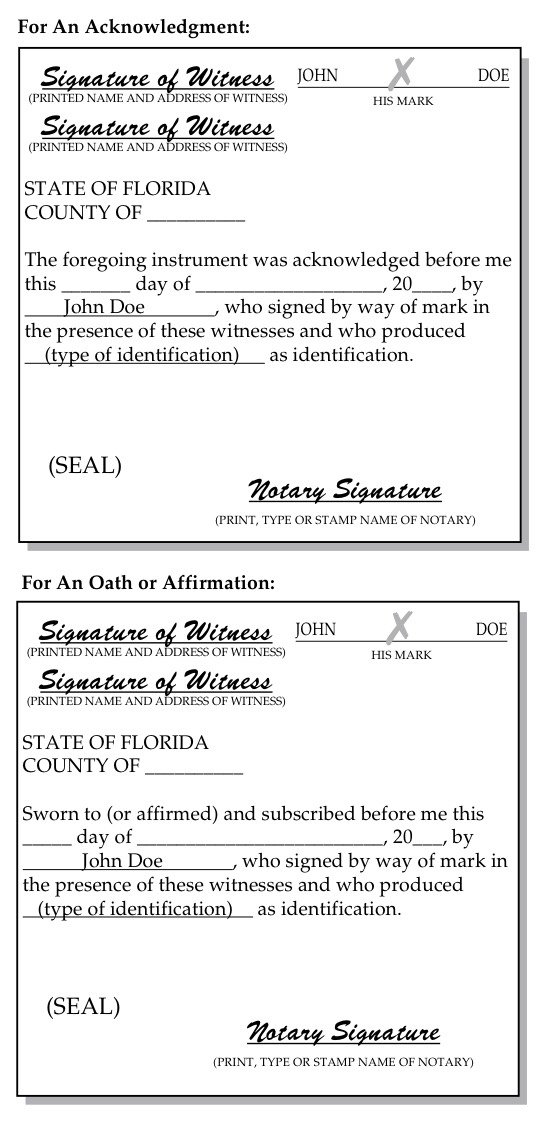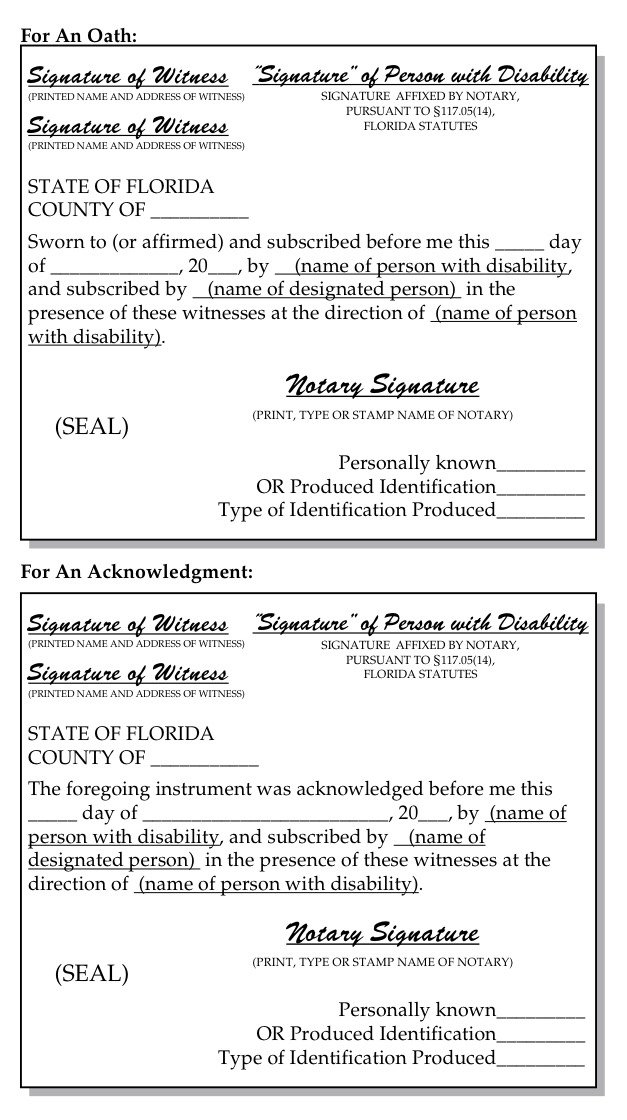Special Circumstances
We all go through special circumstances at some point in our lives, and it is important to recognize that these situations can impact your notarization request.
For A Person Who Is Mentally Incapacitated
The law prohibits the notary public from notarizing the signature of a person who has been adjudicated mentally incapacitated by a court of competent jurisdiction if that notarization pertains to a right that has been removed. These rights refer to such things as the right to vote, to marry, to execute conveyances of real property, etc.
What if the person is usually mentally competent, but is medicated at the time of the notarization, or what if a family member says the person is “in and out” of lucidity due to Alzheimer’s disease or some other mentally debilitating ailment?
When performing any notarization, the notary public will question the signer to determine that he or she is willing and competent to execute the document.
■ You should provide impartial witness for the notarization.
■ If we are asked to go to a hospital or nursing home to provide services, we will check with the patient’s nurse or doctor prior to notarization.
■ The notary public will talk to the person alone. Ask questions unrelated to the notarization. Ask for his name, home address, and telephone number. We could also engage the person in a conversation about his family, his occupation, a television program, a recent news event, etc.
■ The notary public will ask the signer to tell her or him about the document to be notarized. What kind of document do you need to sign? Have you read the document completely? Do you understand the document? Do you need someone to explain the contents of the document to you? Has anyone pressured you to sign this document?
If the notary public feels the person is mentally competent at the time, they will proceed. If in doubt, they will not notarize!
For A Person Who Is Blind
The notary public will read out loud, the document to the document signer.
For A Person Who Does Not Speak English
The nature and effect of the document must be translated into a language that the person does understand. The law does not specify that a written translation is required; therefore, an oral translation is sufficient.
The notary public may not translate the document.
For A Person Who Is Deaf
The obvious problem that exists in this situation is communication. Unless the notary public and the signer are competent in sign language or lip reading, the notary public should communicate with the person by writing notes.
For A Person Who Signs With An “X”
Occasionally, a notary public may be asked to notarize the signature of a person who signs with a mark. The person may be illiterate or may have a physical disability which prohibits him or her from signing in the customary manner.
■ The notary public may question the signer to make sure that he or she understands the nature and effect of the document to be signed. If the person is illiterate, the notary public will read the document to him or her. If the person does not understand, the notary public will refer him or her to their attorney for legal advice and the notary public will not proceed with the notarization.
■ The notary public will ask for proper identification.
■ When performing the appropriate notarial act: the notary public will administer an oath or take an acknowledgment.
■ Before the person signs the document, the notary public will print his or her first name at the beginning of the signature line and the last name at the end of the line. Just below the line, the notary will print the words “His Mark” or “Her Mark.”
Then, the notary public will ask the person to make his or her mark on the designated line.
■ Two uninterested persons must witness the signing of the document and the notarization and that their names and addresses be clearly printed under their signatures. An example acknowledgment is below:
For A Person With A Disability Who Directs Another To Sign
On a rare occasion, the notary public may be asked to notarize the signature of a person who cannot sign a document in the usual manner. In Florida, an individual with a disability may direct a notary to sign on his or her behalf. In a sense, one person substitutes his hands for the hands of the person with a disability. The notary may notarize this signature and should indicate the unusual circumstances in the notarial certificate.
The following guidelines will be exercised by the notary public.
■ Question the person to make sure that he or she understands the nature and effect of the document to be signed. If the person is blind, read the entire document to him or her. If the person does not understand, refer him or her to an attorney for legal advice and do not proceed with the notarization.
■ Ask for proper identification from the person with a disability. It is not necessary to require identification from the designated signer. Think of that person only as the “hands” of the person with a disability.
■ The notary may then sign the signature of the person with a disability at the direction of and in the presence of that person.
■ Perform the appropriate notarial act: administer an oath or take an acknowledgment. The notarial act should be directed to the person with a disability.
■ Complete the notarial certificate with the required information. When stating whose signature is being notarized, it would be best to indicate the special circumstances of the signing.
■ Two persons with no interest in the transaction must witness the signing of the document and the notarization and that their names and addresses be clearly printed below their signatures. Unless otherwise required by law for the particular document, it is not necessary for the witnesses’ signatures to be notarized.
For A Person Signing With Power Of Attorney
Situation: John Doe presents a document to be signed by Nancy Smith. John Doe states that he has power of attorney for Nancy Smith. John Doe signs the document in one of two ways:
(1) John Doe as attorney-in-fact for Nancy Smith
(2) Nancy Smith by John Doe, attorney-in-fact
The first way is the preferred method in Florida.
It is not the notary‘s responsibility to ensure that the signer has power of attorney. The person states he has that authority and indicates this fact when he signs.
For a person who does not have a valid, photo I.D. What is a 2 Credible Witnesses Affidavit?
This is the laws governing notaries of their duties and is not intended as legal advice. For additional information or for difficult situations, it may be advisable for you to seek the advice of a licensed attorney.
Occasionally, a notary is asked to notarize the signature of a person who does not have, and cannot obtain, acceptable identification. This most often occurs when the person is an elderly person, a minor child, or a person with a disability. Florida allows the sworn written statement of two credible witnesses whose identities are proven to the notary and who personally know the signer.
Please note that with this method, the witnesses must personally know the person whose signature is being notarized and must sign a sworn written statement. The 2 witnesses must have acceptable identification.
When using this methods of identification, it is also suggested the two witnesses also sign the document being notarized.
Keep in mind that these provisions are for the purpose of identifying certain people who do not have other identification and do not replace the “presence” requirement. The person whose signature is being notarized must be present at the time of the notarization.

